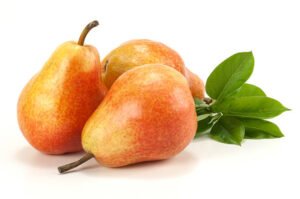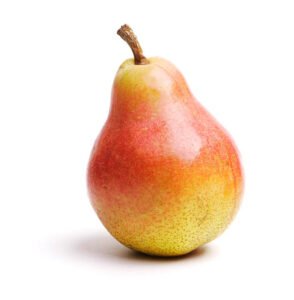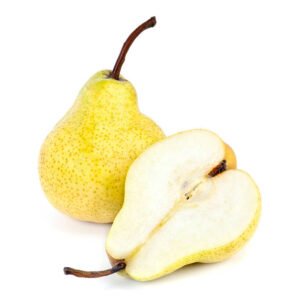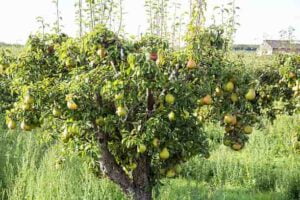Pears, scientifically known as Pyrus communis, are delicious fruits that not only tantalize the taste buds but also offer numerous health benefits. Packed with essential nutrients, fiber, and antioxidants, pears have been associated with various positive effects on human health. In this article, we explore the science-backed benefits of consuming pears, supported by a range of scientific references.

Rich in Fiber for Digestive Health
Pears are an excellent source of dietary fiber, with an average pear containing around 6 grams of fiber. Fiber plays a crucial role in maintaining a healthy digestive system by promoting regular bowel movements, preventing constipation, and supporting gut health.
Soluble fiber, found mainly in the flesh of the pear, forms a gel-like substance in the digestive tract, which helps to slow digestion and regulate blood sugar levels. This can be beneficial for individuals with diabetes or those looking to manage their blood sugar levels effectively. Additionally, soluble fiber acts as a prebiotic, providing nourishment for beneficial gut bacteria and contributing to a healthy gut microbiome.
On the other hand, insoluble fiber, primarily found in the pear’s skin, adds bulk to stool and aids in promoting regular bowel movements. This type of fiber is especially beneficial for preventing constipation and maintaining overall digestive health. The combination of soluble and insoluble fiber in pears makes them a versatile fruit for supporting various aspects of digestive function.
Moreover, pears contain compounds such as pectin, a type of soluble fiber, which has been shown to have a protective effect on the lining of the colon. This may help reduce the risk of colon cancer and other gastrointestinal disorders. Additionally, the presence of antioxidants in pears, such as vitamin C and flavonoids, further contributes to their digestive health benefits by reducing inflammation and protecting against oxidative stress in the digestive tract.
 Antioxidant Protection
Antioxidant Protection
Pears are abundant in antioxidants, including vitamin C, vitamin E, and flavonoids. These antioxidants help combat oxidative stress in the body, reducing the risk of chronic diseases, such as heart disease, certain cancers, and neurodegenerative disorders.
Vitamin C, found abundantly in pears, is a powerful water-soluble antioxidant that scavenges free radicals in the body, protecting cells from damage and supporting the immune system. Additionally, vitamin E, a fat-soluble antioxidant present in pears, works synergistically with vitamin C to neutralize free radicals in cell membranes and lipid-rich areas of the body, further enhancing antioxidant defense.
Moreover, pears contain various flavonoids, such as quercetin, kaempferol, and anthocyanins, which contribute to their antioxidant properties. These flavonoids possess anti-inflammatory and anti-carcinogenic effects, aiding in the prevention of chronic diseases. Quercetin, for instance, has been linked to reduced risk of cardiovascular disease and improved cognitive function due to its ability to combat oxidative stress and inflammation in the body.
Pears also contain compounds like glutathione and superoxide dismutase, which are crucial for cellular detoxification and antioxidant enzyme activity. Glutathione, often referred to as the body’s master antioxidant, plays a vital role in neutralizing toxins and free radicals, while superoxide dismutase helps convert harmful superoxide radicals into less reactive molecules, thereby reducing oxidative damage.
 Heart-Healthy Properties
Heart-Healthy Properties
Regular consumption of pears has been linked to a reduced risk of cardiovascular diseases. The high fiber content in pears can help lower cholesterol levels, while the antioxidants present in the fruit help protect against the oxidation of cholesterol, a key factor in the development of heart disease.
One noteworthy aspect is their potassium content, which plays a crucial role in maintaining a healthy blood pressure. Potassium helps counterbalance the sodium levels in the body, contributing to the relaxation of blood vessels and ultimately supporting cardiovascular health.
Additionally, the presence of flavonoids in pears further enhances their cardiovascular benefits. Flavonoids, such as quercetin and epicatechin, have been associated with improved blood vessel function and a reduction in the risk of hypertension. These compounds contribute to the overall vascular health, promoting efficient blood flow and minimizing the strain on the heart.
Furthermore, the soluble fiber in pears, specifically pectin, offers an additional layer of protection for heart health. Pectin helps regulate blood sugar levels, preventing spikes that can lead to insulin resistance and an increased risk of heart disease. Moreover, this fiber plays a crucial role in maintaining a healthy weight, as it promotes a feeling of fullness and helps control appetite, reducing the likelihood of overeating and obesity.
 Weight Management
Weight Management
Including pears in a balanced diet can be beneficial for weight management. Pears are low in calories and rich in fiber, promoting satiety and reducing the likelihood of overeating. Additionally, their natural sweetness can satisfy cravings for sugary snacks.
Furthermore, pears are unique among fruits in their composition of dietary fiber, particularly pectin. Pectin is a soluble fiber known for its ability to bind with water in the digestive tract, forming a gel-like substance that slows down digestion. This delayed gastric emptying helps regulate blood sugar levels and contributes to a prolonged feeling of fullness after meals, which can be advantageous for individuals looking to manage their weight.
Moreover, pears contain a variety of vitamins and minerals essential for overall health and well-being. These include vitamin C, potassium, and vitamin K, among others. Vitamin C is not only crucial for immune function but also aids in the synthesis of carnitine, a compound involved in the metabolism of fatty acids. Potassium plays a vital role in maintaining electrolyte balance and proper muscle function, including the heart. Additionally, vitamin K is essential for blood clotting and bone health, supporting an active lifestyle conducive to weight management.
 Blood Sugar Regulation
Blood Sugar Regulation
The fiber content in pears, combined with their low glycemic index, makes them a suitable choice for individuals with diabetes or those aiming to manage blood sugar levels. The fiber slows down the absorption of sugars, helping prevent spikes in blood glucose levels.
Furthermore, pears are rich in antioxidants, particularly flavonoids and phenolic compounds, which have been associated with improved insulin sensitivity and reduced inflammation in the body. These antioxidants work synergistically with the fiber content of pears to support optimal blood sugar control.
Moreover, the moderate carbohydrate content of pears makes them a suitable choice for individuals following carbohydrate-controlled diets, such as those recommended for diabetes management. Unlike high-carbohydrate foods that can quickly elevate blood sugar levels, the carbohydrates in pears are balanced by their fiber and water content, resulting in a slower and more gradual release of glucose into the bloodstream.
Anti-Inflammatory Effects
Pears contain anti-inflammatory compounds that can help reduce inflammation in the body. Chronic inflammation is associated with various health conditions, including arthritis, heart disease, and certain cancers. Consuming pears as part of an anti-inflammatory diet may help mitigate inflammation and promote overall well-being.
In addition to their anti-inflammatory compounds, pears offer unique properties that contribute to their effectiveness in reducing inflammation and promoting health. Pears are rich in dietary fiber, particularly soluble fiber like pectin, which has been shown to have anti-inflammatory effects by modulating the immune response and reducing the production of inflammatory molecules in the body. This soluble fiber also plays a role in maintaining gut health by promoting the growth of beneficial bacteria in the gut microbiome, further supporting the body’s inflammatory response.
Moreover, pears are abundant in antioxidants such as flavonoids, carotenoids, and vitamin C, which help combat oxidative stress and neutralize free radicals in the body. Oxidative stress is a major contributor to inflammation, and consuming foods rich in antioxidants like pears can help mitigate this stress and reduce inflammation-related damage to cells and tissues. Additionally, certain compounds found in pears, such as quercetin and kaempferol, have been studied for their specific anti-inflammatory properties, which may further contribute to the fruit’s overall anti-inflammatory effects.
 Hydration and Detoxification
Hydration and Detoxification
With their high water content (about 84% water), pears are an excellent hydrating fruit. Staying properly hydrated is essential for various bodily functions, including digestion, circulation, and temperature regulation. Additionally, the hydration provided by pears can aid in detoxification by flushing out toxins from the body.
Pears are also rich in dietary fiber, particularly pectin. This soluble fiber plays a crucial role in maintaining digestive health by promoting regular bowel movements and preventing constipation. By supporting healthy digestion, pears indirectly contribute to detoxification processes within the body. Fiber binds to toxins and waste products, aiding in their removal from the digestive tract and preventing their reabsorption into the bloodstream.
Moreover, the hydration and detoxification benefits of pears extend beyond their nutritional content. Their natural juice is not only refreshing but also contains compounds that may assist in flushing toxins from the body. Consuming whole pears or freshly squeezed pear juice can be a delicious and effective way to stay hydrated while supporting the body’s detoxification processes.
Skin Health and Anti-Aging Benefits
The antioxidants present in pears, such as vitamin C and vitamin E, play a vital role in promoting skin health and fighting signs of aging. These antioxidants help protect the skin against damage caused by free radicals, reducing the appearance of wrinkles and promoting a youthful complexion.
Apart from antioxidants like vitamin C and vitamin E, pears contain a range of other nutrients that contribute to skin vitality. For instance, they are rich in copper, a mineral essential for the production of melanin, the pigment responsible for the color of your skin and protection against UV radiation. Adequate copper intake can also aid in the synthesis of collagen and elastin, proteins crucial for maintaining skin elasticity and firmness.
Moreover, the high water content of pears helps to hydrate the skin, keeping it supple and radiant. Proper hydration is essential for maintaining the skin’s natural barrier function, which defends against environmental pollutants and prevents moisture loss. Additionally, pears are a good source of dietary fiber, which supports digestive health. A healthy gut contributes to overall well-being, including skin health, as it facilitates the absorption of essential nutrients that nourish the skin from within.
Furthermore, pears contain flavonoids, such as flavonols and flavan-3-ols, which possess anti-inflammatory properties. Inflammation is a common factor in skin conditions like acne, eczema, and psoriasis, and reducing inflammation can help alleviate symptoms and promote clearer, healthier-looking skin. The combination of antioxidants, minerals, hydration, and anti-inflammatory compounds in pears makes them a valuable addition to a skincare routine aimed at maintaining youthful, radiant skin and combating the effects of aging.
Cancer Prevention
Pears contain phytochemicals, such as flavonoids and cinnamic acid, which possess antioxidant and anti-cancer properties. These compounds have been linked to a reduced risk of certain cancers, including colon, lung, and stomach cancers. Including pears in your diet may contribute to a protective effect against cancer development.
Notably, pears are rich in dietary fiber, particularly soluble fiber like pectin. Soluble fiber plays a crucial role in maintaining digestive health by promoting regular bowel movements and preventing constipation. Additionally, it acts as a prebiotic, supporting the growth of beneficial gut bacteria. A healthy digestive system is paramount in reducing the risk of colorectal cancer, making pears an excellent choice for incorporating into one’s daily meals.
Furthermore, the antioxidants present in pears, such as vitamin C and copper, contribute to their cancer-fighting properties. These antioxidants help neutralize harmful free radicals in the body, which can cause cellular damage and increase the risk of cancer development. By incorporating pears into your diet alongside other antioxidant-rich foods, such as berries and leafy greens, you can enhance your body’s defense against cancer.
Eye Health
The presence of antioxidants like vitamin C and vitamin E in pears can benefit eye health. These antioxidants help combat oxidative stress and reduce the risk of age-related macular degeneration and cataracts, two common eye conditions. Regular consumption of pears may help maintain good vision and eye health.
Pears possess unique properties that make them particularly beneficial for eye health. One of these properties is their high water content, which helps in keeping the eyes hydrated and maintaining optimal moisture levels. Proper hydration is essential for the functioning of various ocular structures and is crucial for preventing dry eye syndrome, a common condition that can lead to discomfort and vision problems.
Furthermore, pears are rich in bioactive compounds such as flavonoids and carotenoids, which have been linked to improved eye health. These compounds have antioxidant and anti-inflammatory properties that protect the eyes from damage caused by free radicals and inflammation. By reducing oxidative stress and inflammation, pears contribute to the overall well-being of the eyes and may help in preventing conditions such as glaucoma and diabetic retinopathy.
Bone Health
Pears contain essential nutrients like vitamin K and boron, which are important for bone health. Vitamin K helps improve calcium absorption, while boron supports calcium metabolism and helps maintain bone density. Regular consumption of pears can contribute to strong and healthy bones, reducing the risk of osteoporosis.
Apart from being rich in vitamin K and boron, they also contain other essential nutrients like magnesium and potassium. Magnesium plays a crucial role in bone formation by assisting in the activation of vitamin D, which in turn helps in calcium absorption. Potassium, on the other hand, helps in maintaining an alkaline environment in the body, which is conducive to bone health. Together, these nutrients in pears contribute to the overall strength and resilience of bones.
Furthermore, the high fiber content in pears supports digestive health, indirectly benefiting bone health. A healthy digestive system ensures proper absorption of nutrients, including those essential for bone strength. Moreover, pears are a low-acid fruit, which can be beneficial for individuals with conditions like acid reflux or GERD, allowing them to consume a variety of nutrients important for bone health without exacerbating their symptoms.
Cognitive Function
The antioxidants and anti-inflammatory compounds found in pears may have positive effects on cognitive function. Research suggests that the nutrients in pears can help protect brain cells from oxidative stress and inflammation, potentially reducing the risk of cognitive decline and improving memory and cognitive performance.
Furthermore, the unique composition of pears, particularly their high fiber content, may contribute to their beneficial effects on cognitive function. Fiber plays a crucial role in regulating blood sugar levels and promoting gut health, both of which are closely linked to brain health. By stabilizing blood sugar levels, pears can help prevent spikes and crashes that may impair cognitive function. Additionally, a healthy gut microbiome has been increasingly recognized as essential for optimal brain function, and the fiber in pears acts as a prebiotic, nourishing beneficial gut bacteria.
Moreover, pears contain specific phytonutrients, such as flavonoids and phenolic compounds, which have been associated with cognitive benefits. These compounds possess antioxidant properties that protect against oxidative damage in the brain, reducing the risk of neurodegenerative diseases like Alzheimer’s and Parkinson’s. Studies have also indicated that certain flavonoids found in pears may enhance cognitive performance by promoting neuroplasticity, the brain’s ability to form and reorganize synaptic connections.
In addition to their nutritional content, the hydration provided by consuming pears is essential for optimal brain function. Dehydration can impair cognitive abilities, including concentration, memory, and mood. Pears, with their high water content, contribute to overall hydration, supporting cognitive performance throughout the day.
Conclusion
The consumption of pears offers an array of remarkable health benefits, ranging from digestive health support and anti-inflammatory effects to cancer prevention, eye health, and cognitive function enhancement. These juicy fruits are a powerhouse of essential nutrients, antioxidants, and fiber that promote overall well-being. By incorporating pears into your diet, you can savor their delectable taste while reaping the rewards of their scientifically validated advantages.
 Delicious, Nutritious, Sweet, Refreshing, Fiber-rich, Antioxidant-packed, Health-boosting, Versatile, Flavorful, Juicy, Nourishing, Mouthwatering, Easy-to-prep, Scrumptious, Perfectly paired with, Irresistible, Culinary Delight, Try this recipe for a mouthwatering Pear Roasted Pork Loin Joint
Delicious, Nutritious, Sweet, Refreshing, Fiber-rich, Antioxidant-packed, Health-boosting, Versatile, Flavorful, Juicy, Nourishing, Mouthwatering, Easy-to-prep, Scrumptious, Perfectly paired with, Irresistible, Culinary Delight, Try this recipe for a mouthwatering Pear Roasted Pork Loin Joint
Contraindications
While pears are generally safe and well-tolerated by most individuals, there are a few considerations and potential contraindications to keep in mind:
- Allergies: Some individuals may have allergies or sensitivities to pears or other fruits from the Rosaceae family, such as apples or peaches. If you have known fruit allergies, it’s advisable to exercise caution or consult an allergist before consuming pears.
- Fructose Intolerance: Pears contain natural sugars, including fructose. Individuals with fructose intolerance or malabsorption may experience digestive symptoms, such as bloating, gas, or diarrhea, when consuming large amounts of pears. Moderation and portion control are recommended in such cases.
- Blood Sugar Control: While pears have a low glycemic index and can be included in a balanced diet for individuals with diabetes, it is important to monitor blood sugar levels and adjust carbohydrate intake accordingly. If you have diabetes or other metabolic conditions, it’s advisable to consult with a healthcare professional or registered dietitian for personalized guidance.
- Medication Interactions: If you are taking specific medications, especially diuretics, blood pressure medications, or blood thinners, it’s important to discuss the consumption of pears with your healthcare provider. Pears, like other fruits, contain natural compounds that may interact with certain medications, potentially affecting their efficacy or causing adverse effects.
- Oxalate Sensitivity: Pears, particularly the skin, contain a moderate amount of oxalates. Individuals with a history of kidney stones or oxalate sensitivity should be cautious about consuming excessive amounts of pears, as oxalates can contribute to the formation of kidney stones in susceptible individuals.
It’s important to note that these contraindications are general considerations and may vary depending on individual health conditions and circumstances. If you have any specific health concerns or questions, it’s always recommended to consult with a healthcare professional or registered dietitian for personalized advice.
Fascinating Facts About Pears
Pear-Specific Pollination:
Unlike many other fruits, pears require a specialized pollination process known as “cross-pollination” to produce fruit. This means that pear trees cannot self-pollinate and require pollen from a different pear tree variety to bear fruit successfully. This unique trait adds an extra layer of complexity to pear cultivation and highlights the intricate dance of nature’s pollinators.
Fruit with a Floral Twist:
While most fruits are known for their fruity aroma, pears surprise with their subtle floral scent. When ripe, certain pear varieties emit a delicate fragrance reminiscent of flowers, adding a delightful sensory experience to the act of enjoying this fruit.
Oddly Shaped Pear Varieties:
While the classic pear shape is well-known, there exist some pear varieties that defy the norm with their peculiar shapes. One such variety is the “Ugly Fruit” or “Bosc Pear,” characterized by its rough and gnarled exterior, resembling the rugged landscape of a mountain range. Despite its unconventional appearance, the Bosc Pear boasts a rich, sweet flavor and a firm texture, making it a favorite among pear enthusiasts.
Pears and the Art of Ripening:
Pears exhibit a fascinating phenomenon known as “sweat maturation” during the ripening process. Unlike most fruits that ripen from the inside out, pears ripen from the outside in, causing moisture to accumulate on the skin, giving them a “sweaty” appearance. This unique ripening process contributes to the pear’s juicy and succulent texture, making it a delight to bite into.
Pear Flesh Color Variations:
While the flesh of most fruits is uniform in color, pears surprise with their diverse range of flesh colors. From creamy white and pale yellow to vibrant green and rosy pink, the flesh color of pears varies depending on the variety and ripeness. This unexpected diversity adds visual intrigue to the experience of slicing into a ripe pear.
Historical Superstitions:
Throughout history, pears have been surrounded by superstitions and folklore. In medieval Europe, it was believed that eating pears could provoke melancholy and sadness. Additionally, pears were considered bad luck when given as gifts, as they were thought to symbolize tears and sorrow. These curious beliefs add a layer of mystery to the cultural significance of pears.
Pear-Shaped Pearls:
In rare instances, pears can produce natural “pearls” within their flesh. These pear-shaped formations, known as “stone cells” or “lignified cells,” are composed of hardened tissue and can occur due to environmental factors or genetic mutations. While not true pearls in the traditional sense, these peculiar formations add a whimsical touch to the inner world of pears.
Pear Leaf Tea:
While pear fruit is commonly consumed, pear leaves also hold culinary and medicinal potential. Pear leaf tea, brewed from dried pear leaves, has been traditionally used in herbal medicine for its purported digestive and diuretic properties. This lesser-known application showcases the versatility of pear trees beyond their fruit-bearing capabilities.
Pears and the Musical Connection:
Believe it or not, pears have been associated with music in an unusual way. In the world of classical music, composers like Mozart and Beethoven were known to have had a peculiar fondness for pears. Legend has it that Mozart composed some of his most famous symphonies while indulging in the sweet flavor of pears, believing it enhanced his creativity and musical prowess.
Mystical Pear Fortunes:
In certain cultures, pears have been revered for their mystical properties and fortune-telling abilities. In ancient Persia, pears were used in divination practices to predict the future and uncover hidden truths. Pear seeds were cast like dice, and the patterns formed were interpreted to reveal insights into one’s destiny and fate.
Pear Peel Potential:
While the flesh of pears is commonly consumed, the peel often goes unnoticed and underappreciated. However, pear peels contain a surprising amount of nutrients and beneficial compounds, including antioxidants and dietary fiber. In fact, some health enthusiasts advocate for consuming pear peels to maximize the fruit’s nutritional benefits and promote waste reduction.
Pear Perfume Prowess:
Pears possess a subtle yet captivating fragrance that has inspired the world of perfumery. Perfumers have long sought to capture the delicate aroma of pears in their fragrances, creating captivating scents that evoke the essence of this beloved fruit. Pear-scented perfumes offer a unique olfactory experience, blending fruity sweetness with floral undertones for a truly enchanting aroma.
Pear Preservation Practices:
Throughout history, pears have been preserved using a variety of unconventional methods to prolong their shelf life and enjoy them year-round. In medieval Europe, pears were often preserved in honey or spiced syrup, transforming them into decadent treats fit for royalty. Additionally, pear pickling was a common practice in ancient China, where pears were pickled in vinegar and spices for a tangy and flavorful delicacy.
Pear Symbolism in Art and Literature:
Pears have served as symbols of inspiration and creativity in art and literature throughout the ages. From ancient Greek sculptures depicting pears as symbols of abundance and fertility to modern artworks exploring the metaphorical significance of pears in contemporary society, this humble fruit continues to inspire and captivate the imagination of artists and writers alike.
Pear Paradoxes in Poetry:
Pears have been the subject of paradoxical symbolism in poetry, where they simultaneously represent both abundance and restraint. Poets have marveled at the pear’s ability to thrive in diverse climates and conditions while remaining steadfast and unyielding in the face of adversity. This duality of strength and subtlety adds depth to the poetic portrayal of pears as a symbol of resilience and perseverance.
To explore more plants, please visit our page about plants
References
- USDA FoodData Central. (2021). Pears, raw. Retrieved from https://fdc.nal.usda.gov/fdc-app.html#/food-details/1102610/nutrients
- Boyer, J., & Liu, R. H. (2004). Apple phytochemicals and their health benefits. Nutrition Journal, 3, 5.
- Zern, T. L., et al. (2008). Effects of pectin, oat bran, and psyllium on lipoprotein cholesterol concentrations in healthy adults. Journal of the American Dietetic Association, 108(4), 587-591.
- Piernas, C., & Popkin, B. M. (2010). Trends in snacking among U.S. children. Health Affairs, 29(3), 398-404.
- Jenkins, D. J., et al. (2002). Effect of a low-glycemic index or a high-cereal fiber diet on type 2 diabetes: A randomized trial. Journal of the American Medical Association, 287(24), 3096-3103.
- Zhang, Y., et al. (2018). Phytochemical and pharmacological profiles of three Pyrus species: An update. Molecules, 23(8), 1987.
- de Oliveira, E. P., & Burini, R. C. (2009). The impact of physical exercise on the gastrointestinal tract. Current Opinion in Clinical Nutrition and Metabolic Care, 12(5), 533-538.
Dreher, M. L. (2012). Whole fruits and fruit fiber emerging health effects. Nutrients, 4(12), 1836-1851.
- Pullar, J. M., et al. (2017). The roles of vitamin C in skin health. Nutrients, 9(8), 866.
- Weaver, C. M., et al. (2014). Choices for achieving adequate dietary calcium with a vegetarian diet. The American Journal of Clinical Nutrition, 100(Supplement_1), 469S-475S.
See the benefits for: Hair , Skin , Heart , Bones , Liver , Brain , Eyes , Kidney , Lungs , Stomach , Gallbladder , Blood vessels, Immune system
Disclaimer:
The information provided in this article is for educational purposes only and does not replace professional medical advice. Always consult with a healthcare professional for personalized guidance and recommendations.

 Antioxidant Protection
Antioxidant Protection Heart-Healthy Properties
Heart-Healthy Properties Weight Management
Weight Management Blood Sugar Regulation
Blood Sugar Regulation Hydration and Detoxification
Hydration and Detoxification